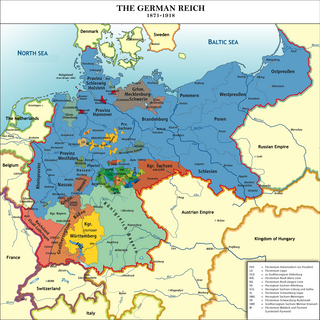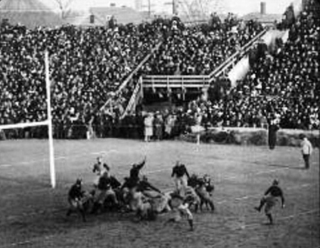Related Research Articles

Otto, Prince of Bismarck, Count of Bismarck-Schönhausen, Duke of Lauenburg, born Otto Eduard Leopold von Bismarck, was a conservative German statesman and diplomat. From his base in the upper class of Junker landowners, Bismarck rose rapidly in Prussian politics. He masterminded the unification of Germany in 1871 and served as its first chancellor until 1890, in which capacity he dominated European affairs for two decades. He had served as the chancellor of the North German Confederation from 1867 to 1871 and alongside the office of chancellor of Germany, he was Prussia's minister president and the minister of Foreign Affairs from 1862 to 1890. Before his rise to the executive power, Bismarck was the Prussian ambassador to Russia and France and served in both houses of the Prussian Parliament. He cooperated with King Wilhelm I of Prussia to unify the various German states, a partnership that would last for the rest of Wilhelm's life. King Wilhelm granted Chancellor Bismarck the titles of Count of Bismarck-Schönhausen in 1865 and Prince of Bismarck in 1871. Bismarck provoked three short, decisive wars against Denmark, Austria, and France. Following the victory against Austria, he abolished the supranational German Confederation and instead formed the North German Confederation as the first German national state, aligning the smaller North German states behind Prussia, and excluding Austria. Receiving the support of the independent South German states in the Confederation's defeat of France, he formed the German Empire – which also excluded Austria – and united Germany.

John Lothrop Motley was an American author and diplomat. As a popular historian, he is best known for his works on the Netherlands, the three volume work The Rise of the Dutch Republic and four volume History of the United Netherlands. As United States Minister to Austria in the service of the Abraham Lincoln administration, Motley helped to prevent European intervention on the side of the Confederates in the American Civil War. He later served as Minister to the United Kingdom during the Ulysses S. Grant administration.
Kulturkampf was the conflict that took place from 1872 to 1878 between the government of Prussia led by Otto von Bismarck and the Roman Catholic Church led by Pope Pius IX. The main issues were clerical control of education and ecclesiastical appointments. A unique feature of Kulturkampf, compared to other struggles between the state and the Catholic Church in other countries, was Prussia's anti-Polish component. By extension the term Kulturkampf is sometimes used to describe any conflict between secular and religious authorities or deeply opposing values, beliefs between sizable factions within a nation, community, or other group.

The National Liberal Party was a liberal party of the North German Confederation and the German Empire which flourished between 1867 and 1918.

Louis Leo Snyder was an American scholar, who witnessed first hand the Nazi mass rallies held from 1923 on in Germany; and wrote about them from New York in his Hitlerism: The Iron Fist in Germany published in 1932 under the pseudonym Nordicus. Snyder predicted Adolf Hitler's rise to power, Nazi alliance with Benito Mussolini, and possibly the war upon the French and the Jews. His book was the first publication of the complete NSDAP National Socialist Program in the English language.

The unification of Germany into the German Empire, a Prussian-dominated nation state with federal features, officially occurred on 18 January 1871 at the Palace of Versailles in France. Princes of most of the German-speaking states gathered there to proclaim King Wilhelm I of Prussia as German Emperor during the Franco-Prussian War.

Gordon Alexander Craig was a Scottish-American liberal historian of German history and of diplomatic history.

Hans-Ulrich Wehler was a German left-liberal historian known for his role in promoting social history through the "Bielefeld School", and for his critical studies of 19th-century Germany.

Albert Otto Hirschman was an economist and the author of several books on political economy and political ideology. His first major contribution was in the area of development economics. Here he emphasized the need for unbalanced growth. He argued that disequilibria should be encouraged to stimulate growth and help mobilize resources, because developing countries are short of decision-making skills. Key to this was encouraging industries with many linkages to other firms.
Robert Max Berdahl is a retired American college and university administrator.
Hajo Holborn was a German-American historian and specialist in modern German history.

The 1912 college football season was the first of the modern era, as the NCAA implemented changes to increase scoring:

The Alvensleben Convention was a treaty between the Russian Empire and the Kingdom of Prussia, named after general Gustav von Alvensleben. It was signed in St. Petersburg on 8 February 1863 by Alvensleben and Alexander Gorchakov.
Karl Freiherr von Vincent, born 11 August 1757 – died 7 October 1834, fought in the army of Habsburg Austria during the French Revolutionary Wars. He first served as a staff officer then later as a combat commander. During the Napoleonic Wars, he was given important commands in two campaigns. He was Proprietor (Inhaber) of a famous light cavalry regiment from 1806 until his death.

Georg von Vincke was a Prussian politician, officer, landowner and aristocrat of the Vincke family.
Theodore Stephen Hamerow was a Polish-born American historian, focusing on modern history, especially German history of the 19th and 20th century.
Frederic Lawrence Holmes was an American historian of science, specifically for chemistry, medicine and biology.
Alon Confino is an Israeli cultural historian. He currently serves as the Director of the Institute for Holocaust, Genocide, and Memory Studies and a Professor of History and Judaic Studies at University of Massachusetts Amherst.
The Camille Dreyfus Teacher-Scholar Awards are awards given to early-career researchers in chemistry by The Camille and Henry Dreyfus Foundation, Inc. to "to support the research and teaching careers of talented young faculty in the chemical sciences." The Dreyfus Teacher-Scholar program began in 1970. In 1994, the program was divided into two parallel awards: The Camille Dreyfus Teacher-Scholar Awards Program, aimed at research universities, and the Henry Dreyfus Teacher-Scholar Awards Program, directed at primarily undergraduate institutions. This list compiles all the pre-1994 Teacher-Scholars, and the subsequent Camille Dreyfus Teacher-Scholars.
References
- ↑ "Otto Paul Pflanze (1918-2007) | Perspectives on History | AHA". www.historians.org. Retrieved 2020-03-28.
- ↑ Kraehe, Enno E. (1990). Pflanze, Otto (ed.). "On Otto Pflanze's Bismarck Trilogy". Central European History. 23 (4): 368–378. doi:10.1017/S0008938900021683. ISSN 0008-9389. JSTOR 4546183.
- ↑ Kraehe, Enno E. (December 1990). "Otto Pflanze's Bismarck Trilogy". Central European History. 23 (4): 368–378. doi:10.1017/S0008938900021683. ISSN 1569-1616.
- ↑ The written source for some of this biographical synopsis is Charles Goodwin Pflanze, the second son.
- ↑ Gay, Peter (1992-01-26). "A Master Diplomat and a Good Hater". The New York Times. ISSN 0362-4331 . Retrieved 2020-03-28.